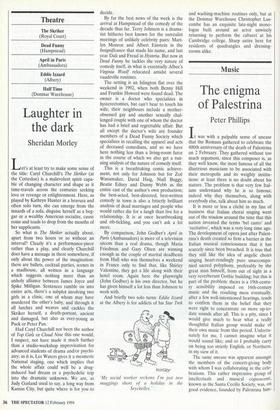Theatre
The Skriker (Royal Court) Dead Funny (Hampstead) April in Paris (Ambassadors) Eddie Izzard (Albery) Half Time (Donmar Warehouse)
Laughter in the dark
Sheridan Morley
Let's at least try to make some sense of the title: Caryl Churchill's The Skriker (at the Cottesloe) is a malevolent spirit capa- ble of changing character and shape as it time-travels across the centuries seeking love or revenge or enlightenment. Here, as played by Kathryn Hunter in a bravura and often solo turn, she can emerge from the innards of a sofa, disguise herself as a beg- gar or a wealthy American socialite, cause coins and toads to drop from the mouths of her supplicants.
So what is The Skriker actually about, apart from two hours or so without an interval? Clearly it's a performance-piece rather than a play, and clearly Churchill does have a message in there somewhere, if only about the power of the imagination: there are ballets, cocktail parties, scenes in a madhouse, all written in a language which suggests nothing more than an unholy alliance between James Joyce and Spike Milligan. Sentences ramble on into entire acts, there's a subplot involving two girls in a clinic, one of whom may have murdered the other's baby, and through it all lurches and weaves and cackles the Skriker herself, a death-portent, ancient and damaged, but also as ever-young as Puck or Peter Pan.
Had Caryl Churchill not been the author of Top Girls or Cloud Nine this one would, I suspect, not have made it much further than a studio-workshop improvisation for advanced students of drama and/or psychi- atry; as it is, Les Waters gives it a mesmeric National staging, one which implies that the whole affair could well be a drug- induced bad dream or a psychedelic trip into the dramatic unknown. We are, as Judy Garland used to say, a long way from Kansas City, but quite where is for you to decide.
By far the best news of the week is the arrival at Hampstead of the comedy of the decade thus far. Terry Johnson is a drama- tist hitherto best known for the surrealist meetings of unlikely celebrity pairs: Mari- lyn Monroe and Albert Einstein in the Insignificance that made his name, and last year Dali and Freud in Hysteria. But now in Dead Funny he tackles the very nature of comedy itself, in what is essentially Albee's Virginia Woolf relocated amidst several vaudeville routines.
The setting is an Islington flat over the weekend in 1992, when both Benny Hill and Frankie Howerd were found dead. The owner is a doctor who specialises in hysterectomies, but can't bear to touch his wife; their neighbours include a mother- obsessed gay and another sexually chal- lenged couple with one of whom the doctor has had a brief and regrettable affair. But all except the doctor's wife are founder members of a Dead Funny Society which specialises in recalling the apparel and acts of deceased comedians, and so we have here nothing less than a living-room farce in the course of which we also get a run- ning analysis of the nature of comedy itself.
This is a breathtaking comic achieve- ment, not only for Johnson but for Zod Wanamaker, David Haig, Niall Buggy, Beatie Edney and Danny Webb as the entire cast of the author's own production; the best-acted, best-directed, best-written comedy in town is also a bitterly brilliant analysis of dead marriages and people who would rather die for a laugh than live for a relationship. It is at once heartbreaking and rib-tickling, and you can't ask a lot more.
By comparison, John Godber's April in Paris (Ambassadors) is more of a television sitcom than a real drama, though Maria Friedman and Gary Olsen are winning enough as the couple of marital deadbeats from Hull who win themselves a weekend in France only to find that, like Shirley Valentine, they get a life along with their hotel room. Again here the playwright (John Godber) is his own director, but he has given himself a lot less than Johnson to work with.
And briefly two solo turns: Eddie Izzard at the Albery is for addicts of his Star Trek 'My social worker reckons I'm just two muggings short of a holiday in the Seychelles.' and washing-machine routines only, but at the Donmar Warehouse Christopher Lus- combe has an exquisite late-night mono- logue built around an actor unwisely returning to perform the cabaret' at his Cambridge college. Sharp satire here for residents of quadrangles and dressing- rooms alike.


















































 Previous page
Previous page